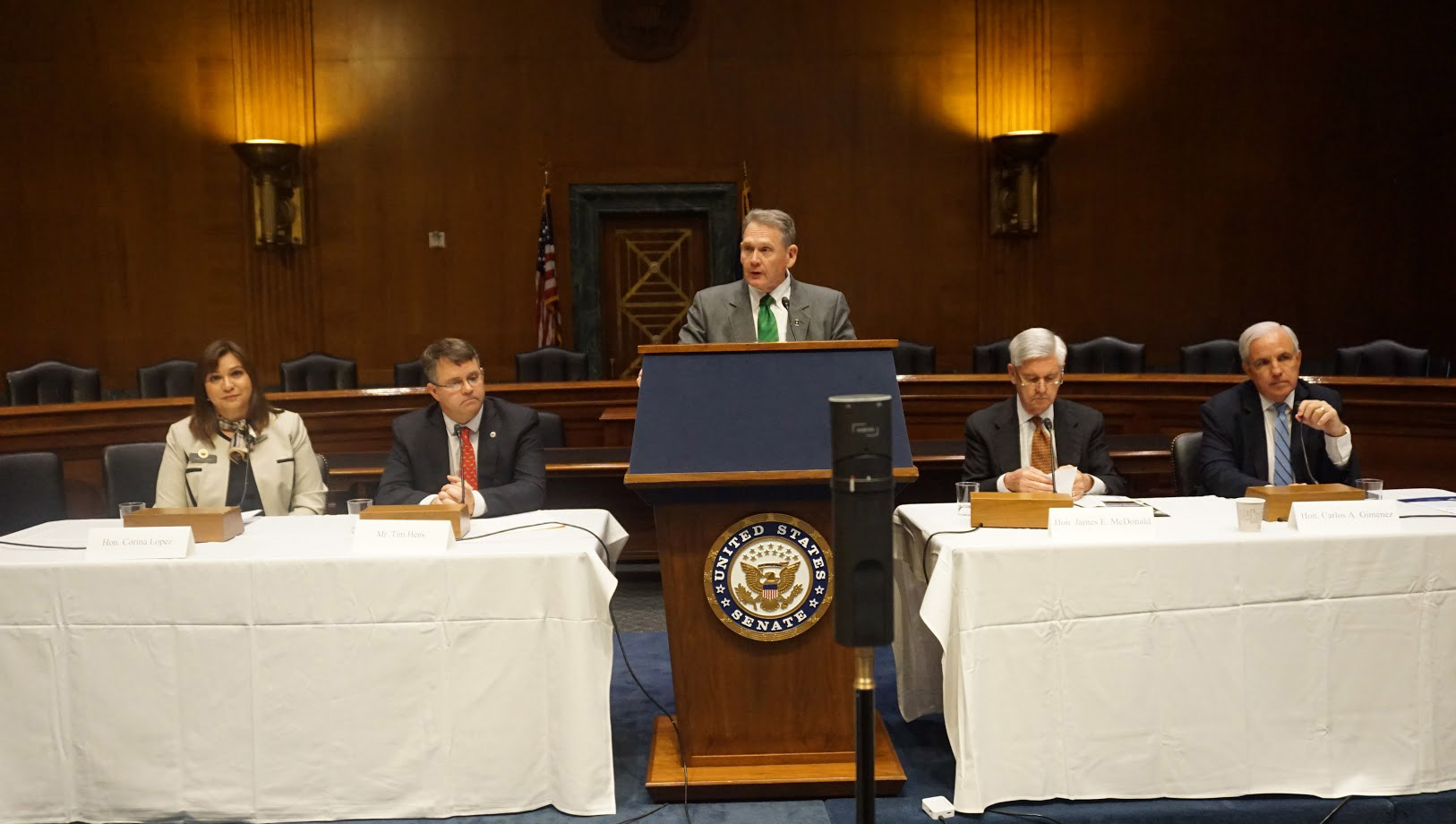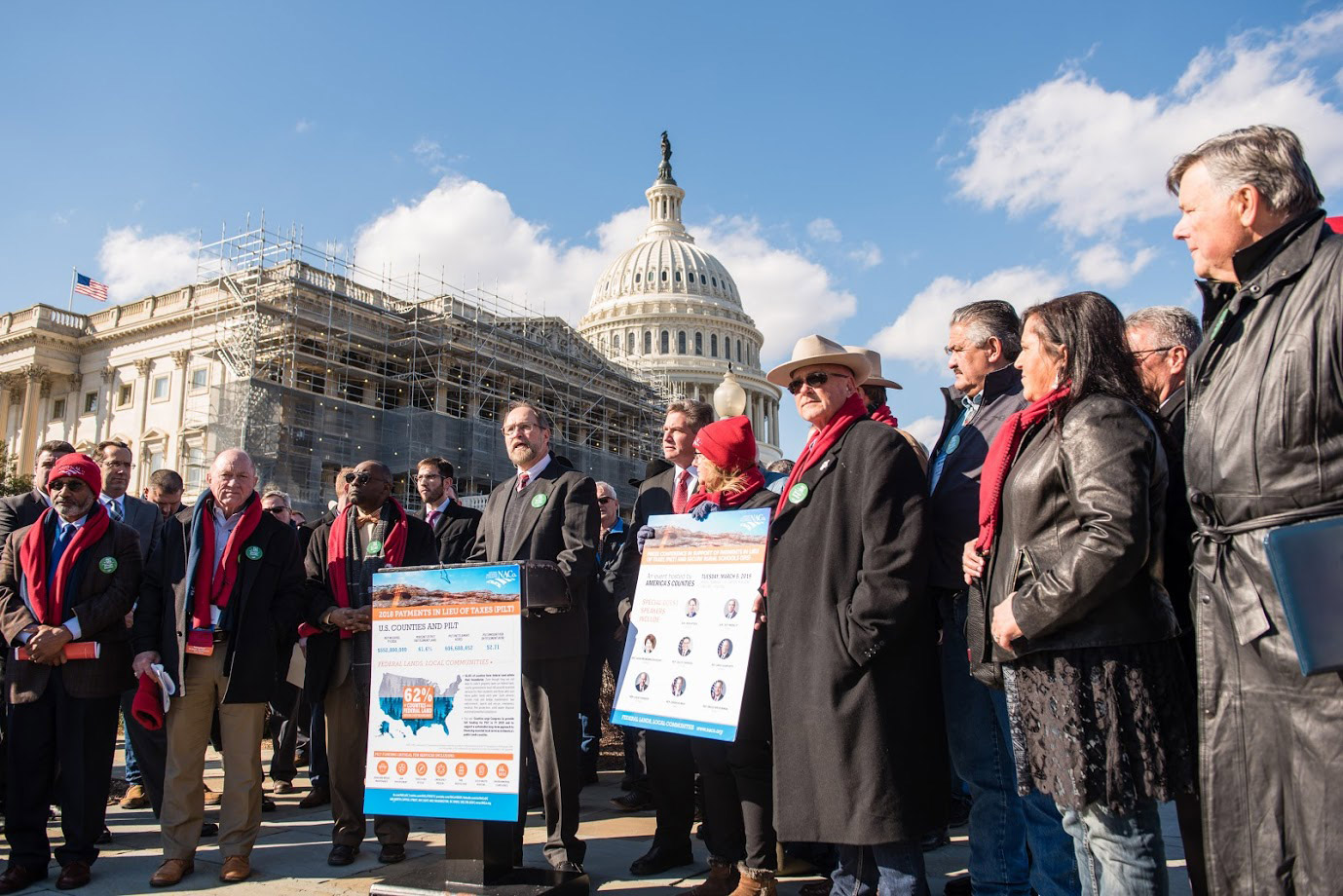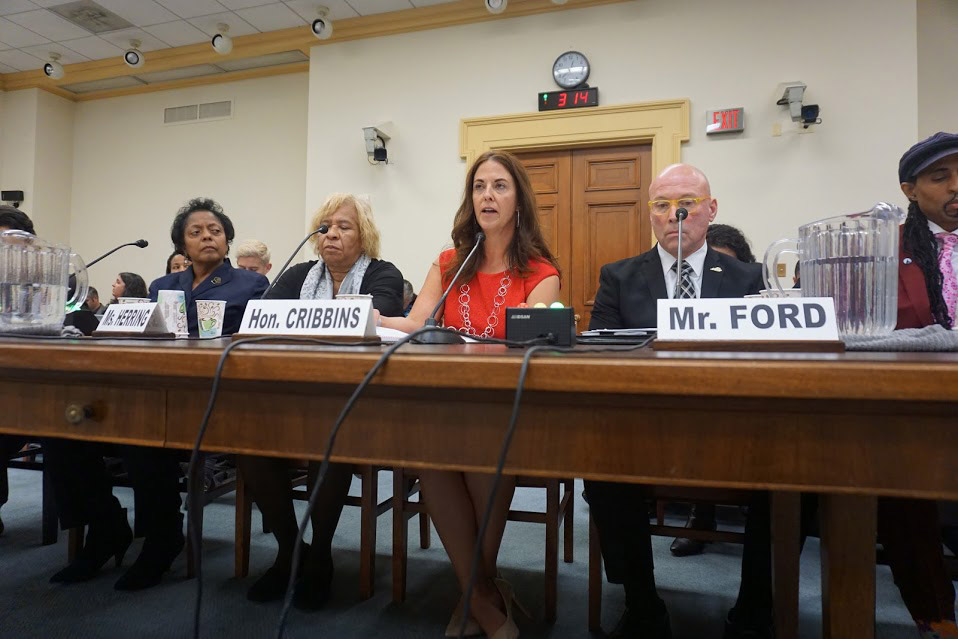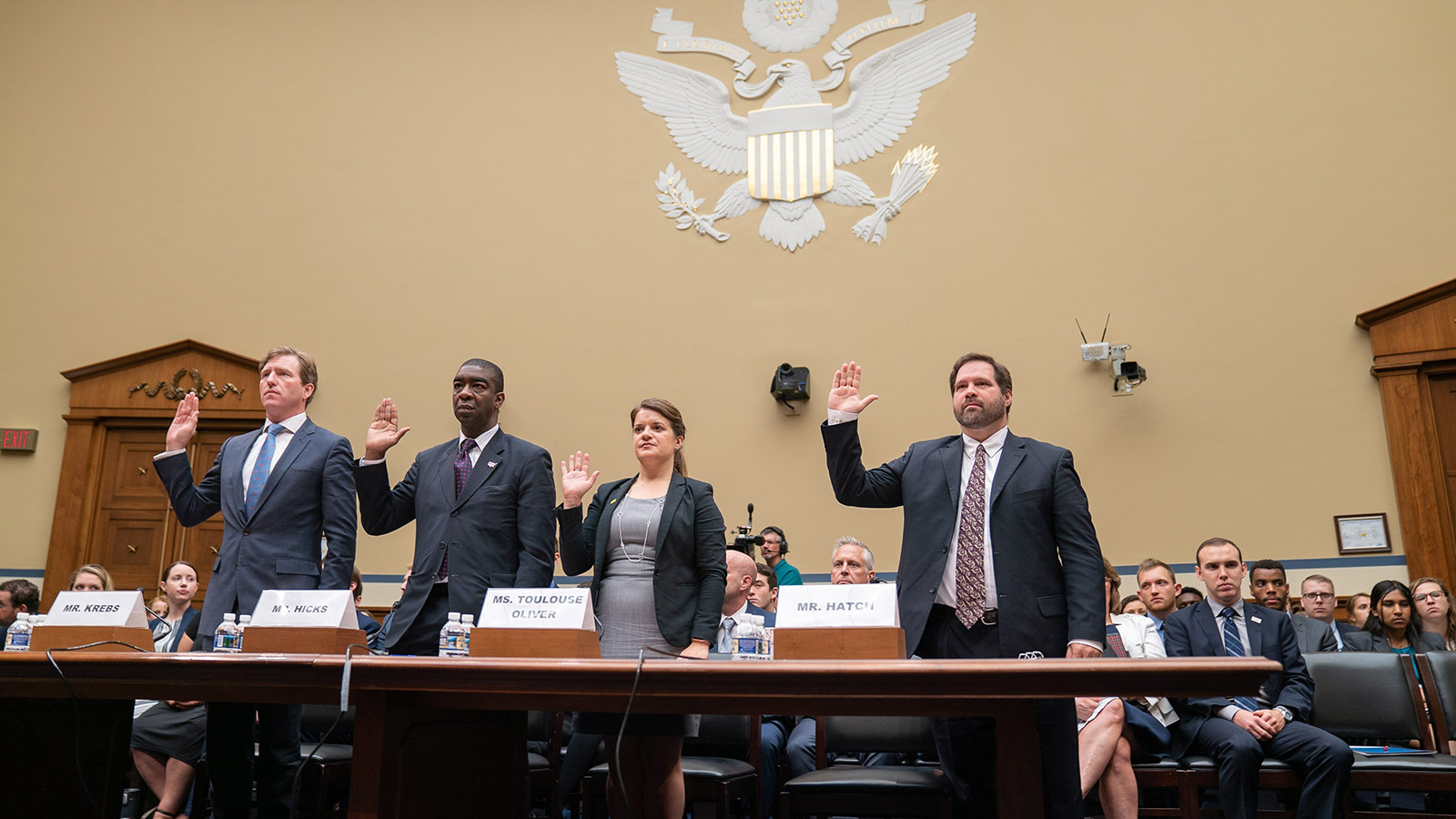2020 NACo Policy Priorities
Upcoming Events
Related News
Counties play an instrumental role in the overall public administration and governance of federal, state and local policies, programs and services.
America’s 3,069 county governments provide essential building blocks for healthy, safe and vibrant communities. Counties invest nearly $600 billion each year in taxpayer resources, through the leadership of nearly 40,000 county elected officials and 3.6 million county employees. Counties support and maintain key public and community infrastructure, help nurture and sustain a skilled workforce to support dynamic local economies, and promote public health and safety to protect our citizens.
NACo supports federal policies and programs that equip county governments with the resources and flexibility needed to effectively serve our residents. NACo works to preserve local decision making and protect counties from unfunded mandates and preemption of local authority. Since counties implement many federal programs at the local level and must enforce many federal regulations, NACo encourages meaningful intergovernmental consultation with counties throughout all federal policy, program and regulatory development processes.
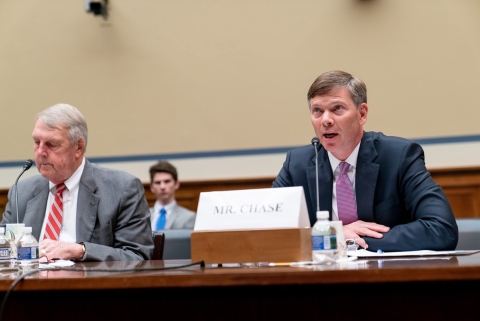
|
NACo CEO Matt Chase testifies on the importance of establishing a national commission on intergovernmental relations before the U.S. House Committee on Oversight and Reform’s Subcommittee on Government Operations.
Restore the Balance of Federalism and Optimize Intergovernmental Partnerships
NACo supports efforts that recognize and respect the unique roles and responsibilities of counties as essential partners—not just stakeholders—in our nation’s intergovernmental system of federal, state, local and tribal government officials. Consistent and meaningful engagement and consultation between intergovernmental partners is vital in the development and implementation of effective policies, programs and regulations. County governments are tasked with both implementing state and federal policies and regulations at the local level and should be included at all stages of the governing process. NACo urges Congress to pass the Restore the Partnership Act (H.R. 3883) and the Unfunded Mandates Information and Transparency Act (H.R. 300) to increase transparency to reduce regulatory burden, foster intergovernmental dialogue and unite all levels of government in supporting our unparalleled system of federalism.
|
NACo's Transportation Policy Steering Committee Chair Randy Maluchnik from Carver County, Minnesota highlights the importance of increased investments in, and reforms to, critical transportation programs during a Capitol Hill briefing.
Promote County Infrastructure Priorities
NACo supports efforts by the Administration and Congress to increase our nation’s infrastructure investments to help promote economic development, public safety and overall mobility through a comprehensive infrastructure package, surface transportation reauthorization and water resources bill. Any federal infrastructure package should reflect county priorities, such as: allocating more federal seed capital and matching funds for locally owned infrastructure, increasing local decision-making authority and flexibility, protecting and restoring tax-exempt municipal financing tools, and streamlining and shortening the federal permitting process while still requiring robust public participation and world-class environmental stewardship.
NACo supports a two-year authorization of the Water Resources and Development Act (WRDA) that will address county interests related to ports, inland waterways, levees, dams, wetlands, watersheds and coastal restoration. As owners, users and regulators of water resources and infrastructure, counties are directly impacted by the policies and funding authorized through WRDA authorizations. Any water infrastructure legislation should address the needs of counties, including: allocating federal matching funds for local governments to plan for and implement projects that reduce flood damage risks and address habitat restoration, connectivity and resiliency, ensuring counties are consulted prior to the federal government undertaking water resource projects within county boundaries, and strengthening the federal-state-local partnership in the decision-making process for water projects.
Counties own and operate 45 percent of all public roads and almost 40 percent of the National Bridge Inventory and are directly involved in 78 percent of all public transportation systems and 34 percent of public airports
Counties also invest $122 billion annually in maintaining and operating public works, including transportation and water systems
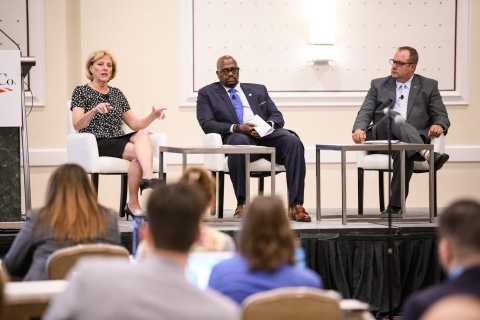
|
Co-chair Commissioner Nancy Sharpe from Arapahoe County, Colo. and Sheriff Jerry Clayton from Washtenaw County, Mich. discuss the work of NACo’s joint task force with the National Sheriff’s Association (NSA) to address the Medicaid Inmate Exclusion Policy (MIEP) during the 2019 Annual Conference.
Promote Mental Health and Substance Use Treatment and Address Essential Criminal Justice Reforms
NACo supports sensible measures that promote and advance the overall safety of the public, and enhances federal, state, and local partnerships to provide evidence-based treatment services to justice involved individuals suffering with mental illness and substance use disorders. NACo urges Congress and the Administration to advance legislation and regulations that would amend the federal Medicaid Inmate Exclusion Policy (MIEP) and allow non-convicted individuals to have continued access to necessary treatment through federal health benefits such as Medicaid, Medicare, CHIP and VA health benefits. Furthermore, NACo supports policies and programs that divert non-violent individuals struggling with mental illness and/or substance use disorders from local jails into more appropriate treatment services.
Approximately 8.5 million adults have both a mental health and substance use disorder
10.6 million individuals cycle in and out of more than 3,000 local jails each year
20 percent of jail inmates have a serious mental illness
Counties own and support 903 hospitals and operate 1,943 local health departments
Unconvicted Inmates in County Jails, 2016
https://ce.naco.org/?dset=Jails%20-%20Inmate%20Demographics&ind=Unconvicted%20Inmates&embed=true
|
NACo’s Western Interstate Region (WIR) President Kevin Cann from Mariposa County, California highlights the importance of the PILT and SRS programs before a press conference during the 2019 Legislative Conference.
Support Full Funding for Payments In Lieu Of Taxes (PILT) and the Secure Rural Schools (SRS) Program
NACo supports restoring full mandatory funding for the Payments in Lieu of Taxes (PILT) program, which compensates public lands counties for untaxable federal land. NACo also supports extending the Secure Rural Schools (SRS) program as a transitional funding mechanism until the federal government fully implements a sustainable, long-term forest management program with adequate revenue sharing for forest counties and schools.
NACo supports legislation to ensure mandatory, full-funding of PILT, including H.R. 3043, the Permanently Authorizing PILT Act sponsored by Rep. Ann Kirkpatrick (D-Ariz.), and S. 2480, the PILT Reauthorization Act sponsored by Sen. Ron Wyden (D-Ore.), which would make PILT mandatory for ten years.
NACo endorses legislation to extend SRS for an additional two years: H.R. 3048, sponsored by Rep. Joe Neguse (D-Colo.), and S. 430, sponsored by Sen. Mike Crapo (R-Idaho). Additionally, Sen. Ron Wyden (D-Ore.) sponsored S. 1643, the Forest Management for Rural Stability Act, which would create an endowment fund to make permanent SRS payments to national forest counties and schools while also granting more flexibility to counties in the use of SRS funds.
61 percent of counties have federal land within their boundaries
PILT and SRS support critical county services, including emergency services, search and rescue, fire protection, forest maintenance, education and transportation infrastructure
2019 Payments In Lieu Of Taxes (PILT) Profiles
https://ce.naco.org/?dset=Payments%20in%20Lieu%20of%20Taxes%20(PILT)&ind=PILT%20Profiles&embed=true
2019 Secure Rural Schools Profiles
https://ce.naco.org/?dset=Secure%20Rural%20Schools%20(SRS)&ind=SRS%20Profiles&embed=true
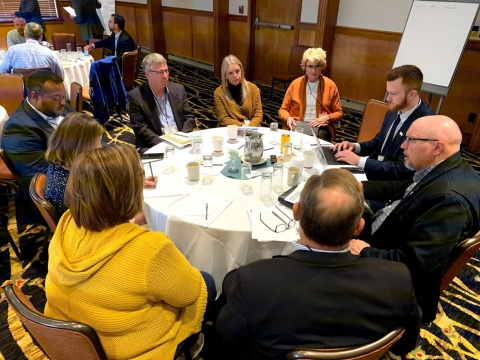
|
Members of NACo’s Rural Action Cacus (RAC) meet to discuss the necessity for increased access to critical broadband resources in rural counties.
Boost Advanced Broadband Deployment and Accessibility While Preserving Local Decision-Making
NACo supports the deployment and availability of emerging technologies, such as small cell 5G, to all areas of the nation to ensure equitable economic and educational opportunities for all. County officials must also fulfill our responsibilities as trustees of public property and as protectors of public safety and health during this deployment process. By preserving local authority, county governments can ensure that the public interest is being served by communications providers regardless of the delivery platform.
Additionally, complete and accurate connectivity data is necessary to effectively bridge the growing digital divide as the federal government relies on this information to determine the true need for critical broadband resources.
NACo urges Congress and federal agencies to recognize counties as partners in extending the benefits of advanced telecommunications and broadband technology — including improvements to county emergency preparedness and public safety systems — to all Americans. Federal policymakers should support local decision-making and accountability and oppose any actions that would preempt or limit the zoning and siting authority of local governments.
In rural areas, just 68.6 percent of residents have high-speed internet access via both fixed wireless services and mobile LTE broadband
Approximately 14 million rural Americans and 1.2 million Americans living on tribal lands still lack access to broadband that meets the federal definition for minimum standards
|
NACo’s Environment, Energy and Land Use (EELU) Policy Steering Committee Chair Melissa Cribbins from Coos County, Oregon testifies before the U.S. House Energy and Commerce Committee’s Subcommittee on Environment and Climate Change on the county role in environmental stewardship, land use and economic resiliency.
Establish a More Effective Definition of “Waters Of The U.S.”
NACo believes that local streets, gutters and human-made ditches should be excluded from the definition of “Waters of the U.S.” (WOTUS) under the federal Clean Water Act. NACo calls on Congress and the Administration to develop and implement a new, more practical WOTUS definition in consultation and collaboration with state and local governments.
More than 70 percent of counties invest in storm sewer systems, sewage disposal, solid waste management and water utilities
Counties invest $23.9 billion in sanitation, storm and water supply systems
The final repeal of the 2015 WOTUS rule issued by the Trump Administration became effective on December 23, 2019.
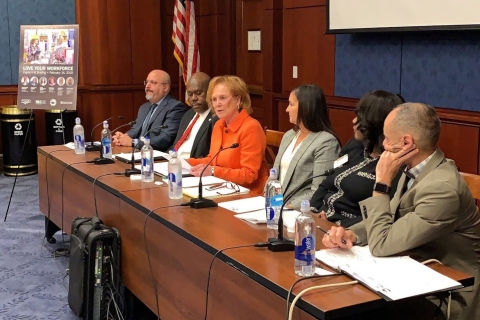
|
Commissioner Pamela Lancaster from Hall County, Neb. highlights the importance of reauthorizing the Workforce Innovations and Opportunity Act (WIOA) during a Capitol Hill Briefing, in order to provide counties the increased resources needed to foster a high-quality workforce while maintaining local decision-making and flexibility.
Promote Workforce Opportunities and Supportive Services for County Residents in Changing Economies
NACo supports federal investments and policies that help advance and leverage both regional and local strategies to engage children, youth, adults and older adults in the development of a competitive and quality workforce. While national economic indicators are strong, many counties face challenges in linking residents to sustainable employment opportunities that foster economic mobility.
For example, counties are confronting increased demand and caseloads for services that help residents overcome barriers to employment, such as skills training, mental health and substance abuse disorders, accessible childcare and housing affordability.
At the same time, county governments face reduced federal and state funding, along with growing federal and state mandates, limitations and oversight. To help counties meet these challenges and foster a high-quality workforce to compete in the global economy and meet the needs of employers including county governments here in the U.S., NACo encourages a strong federal partner committed to providing increased resources and maintaining local decision-making and flexibility to achieve better outcomes for county residents, especially those in transitioning local economies.
Despite low rates of unemployment, two-thirds of counties have poverty rates exceeding the national average
Counties employ 3.6 million residents and provide services to 314 million county residents
|
County Clerk/Auditor Ricky Hatch from Weber County, Utah testifies before the House Committee on Oversight and Government Reform to discuss the role counties play in ensuring safe and efficient elections.
Strengthen Election Integrity and Safety
NACo supports federal policies that provide flexibility for local decision making and increased federal investments in the nation’s elections system. As administrators and financers of our elections, counties work to ensure our elections are both fair and secure. Therefore, NACo supports a consistent, predictable and dedicated federal funding stream to assist counties with meeting the significant federal requirements already imposed on local governments administering elections. We also support efforts by Congress and the Administration to combat cybersecurity threats in a way that is inclusive of county election and technology officials.
As Congress considers these changes, NACo urges federal lawmakers to protect local control over election administration and oppose mandates and specific requirements regarding equipment, procedures and personnel responsibilities.
Between the 2016 and 2018 general elections, county jurisdictions processed over 73 million registration forms
More than 109 million voters, or almost 91 percent of voters nationwide, in the 2018 general elections cast their ballots within jurisdictions where counties play a major role in administering and coordinating elections
In 2018, counties oversaw more than 151,000 polling places and organized over 593,000 poll workers during election periods
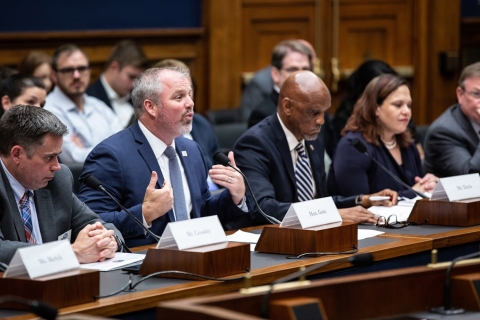
|
Supervisor James Gore from Sonoma County, Calif. highlights the role America’s counties play in disaster mitigation, preparedness, response and recovery during a testimony before the U.S. House Transportation and Infrastructure Committee Subcommittee on Economic Development, Public Buildings and Emergency Management.
Enhance Community Resilience Through Regional and Local Disaster Preparedness
NACo urges Congress and the Administration to provide increased federal resources to counties for disaster planning, mitigation and recovery. Counties often serve as our nation’s first line of defense before and after disasters strike. While state statutes and organizational structures vary, local emergency management responsibilities are most commonly vested in county governments. NACo supports increased federal investment in support of local emergency management capabilities that improve public safety and environmental stewardship, along with social and economic security.
Furthermore, NACo supports rapid federal reimbursement of local costs associated with major disasters and encourages the U.S. Department of Homeland Security (DHS) to administer policies and regulations on a consistent manner during any presidentially declared disaster or emergency throughout the country. NACo also encourages DHS to apply any policy or regulation changes on a prospective basis, based on the declaration date of the emergency or disaster. NACo supports DHS and FEMA leadership as they work to reduce excessive paperwork as well as overly restrictive and bureaucratic regulations.
In 2018, local governments were impacted by 66 federally declared disasters funded by recovery grants
In total, an estimated 570 counties received at least one federal Major Disaster Declaration, with 411 with at least one federal Emergency Declaration and another 788 counties with at least one federal Disaster Declaration
During that same time period, local and state governments managed 23,331 emergency events without additional federal resource
2018 Total Number of Disaster Declarations
Government Affairs Staff Directory
- About NACo,
- Intergovernmental Affairs,
- Agriculture,
- Community & Economic Development,
- Environment, Energy & Land Use,
- Health,
- Human Services,
- Justice & Public Safety,
- Education & Workforce Development,
- Public Lands,
- Rural Counties,
- Urban Counties,
- Tax & Finance,
- Telecommunications & Technology,
- Transportation & Infrastructure
